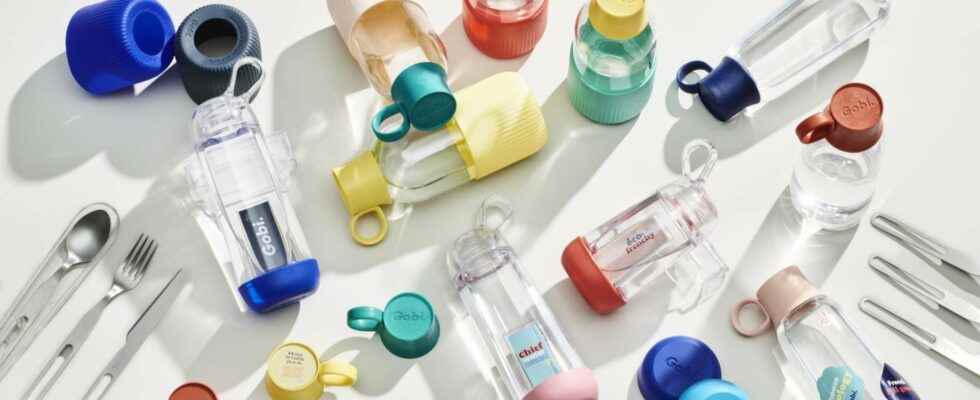You may also be interested
[EN VIDÉO] Microplastics: from the river to the ocean The Yangzi Jiang is the most important river in China. And it has long been suspected to be the world’s biggest source of microplastic pollution. Researchers from the University of Michigan (United States) are now showing how it carries large concentrations of microplastics which then disperse into the South China Sea. (in English) © University of Michigan
Interested in CSR topics since 2005 within a strategic consulting firm in which she worked, Florence Baitinger had the desire to undertake to accelerate on these issues through immediate and impactful changes. From there was born Gobi, the gourd at the start for remove the disposable of the office and which has become a symbol of a new way of manufacturing. Florence Baitinger, co-founder of Gobilab, answers our questions.
Futura: What is your solution?
Florence Baitinger: Our desire at the start was to offer an ecological way of hydrating at work with Gobi, the eco-designed, reusable and customizable water bottle. It became our flagship product for about ten years, then we offered a version in recycled glass but also a whole range of cups, cutlery, to meet the problems ofhydration and lunch. At the same time, we launched free tapsa application which allows you to find drinking water points around you because we want to bring about a change in consumption habits and improve the image of tap water. We are also actively working to promote tap water and encourage everyone to take action to protect the groundwater external pollution: for water too, you have to go organic!
Futura: Why will your start-up change the world?
Florence Baitinger: The trigger was made in 2010 by noting the madness of these little bottles of water thrown away barely consumed. Hence the idea of this reusable water bottle, whose use was more widespread in the Nordic countries for example, but not yet in France. The gate entry? The corporate world in which two million cups for water and two million cups for coffee were consumed per year, rather than the general public in which the ideology of ” it’s recycled, so no problem was widespread. In addition, the fact of emptying the dustbins of these waste visually concretized the efforts emerging of the company in favor of their CSR policy. We have also made the choice to manufacture our products entirely in France, which makes it possible to create, directly and indirectly, more than 70 jobs, including 20 solidarity jobs and to avoid between 10 and 20% ofemissions of greenhouse gas.
Futura: How did the project grow?
Florence Baitinger: Gobilab was therefore born in 2012 with two co-founders including Samuel Degrémont, my partner still today. From the beginning, we wanted to make sure that it was not a false good idea for the environment by taking into account the entire life cycle of the bottle, from its manufacture to its recycling. Hence the choice of eco-design and precise measurements on several indicators to achieve a net environmental benefit in a few months. We worked with the Mu cooperative by applying the precautionary principle, that is to say with health guarantees beyond the regulations, tested and validated in independent laboratories. L’Ademe Ile-de-France validated this approach, then the Region helped us find an industrial partner, Bpifrance granted us a loan and we were incubated by Willa. In 2015, the adventure benefited from a tremendous boost projector because we have equipped the 40,000 participants with the COP21 with our reusable water bottle.
Futura: If you were Prime Minister, what key measure would you put in place?
Florence Baitinger: It is essential for me to move from the premium to vice to the premium to virtue. We face unfair price competition with countries that are much less attentive to social and environmental issues. The AGEC law (Anti-waste for a circular economy) allowed a huge advance to get out of the plastic disaster single-use between 2020 and 2040. The dynamic is the same at European level with the “ Stop Single Use Plastic “. We are starting to talk about taxing “negative externalities”, for example CO2 issued to manufacture and transport the product, and that is where we have to go. Moving from a “predatory” economy to a “regenerative” economy.
Futura: What will the world look like in 2050?
Florence Baitinger: I force myself to be optimistic for my children. I owe them that. I see a lot of hopefuls in many industrial sectors moving on these issues and individuals changing their way of life. The health crisis will also have at least allowed a certain awareness of this alert of nature, even if the link with the biodiversity has not been sufficiently explained. Anyway, with the two billion people who will have to move because of the climatewe must find solutions to share the world and its resources instead of turning inward. Sobriety is not a punishment, but on the contrary, a release.
Futura: What Futura hot topic excites you?
Florence Baitinger: Recently an article on the discovery of black hole. The article was crazy. He said ” it moves at 45 km/second, which makes it an old black hole but also a runaway black hole, probably ejected into space when its star progenitor exploded in supernova “Great, right? No idea what it’s really about but it immediately opens the imagination and helps to put itself back in its rightful (small) place in the universe and its mysteries.
Interested in what you just read?
